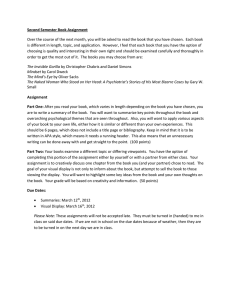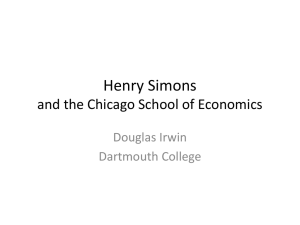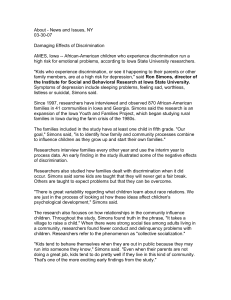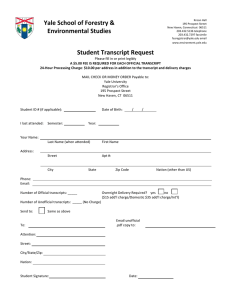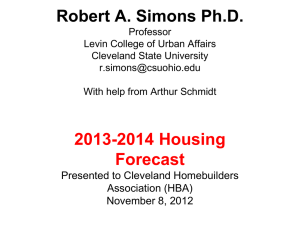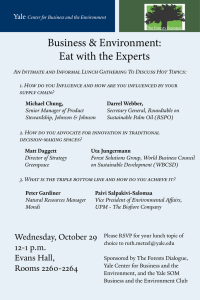Yale UCL Poetry Competition 2014 Winners 2014 Joint first place:
advertisement
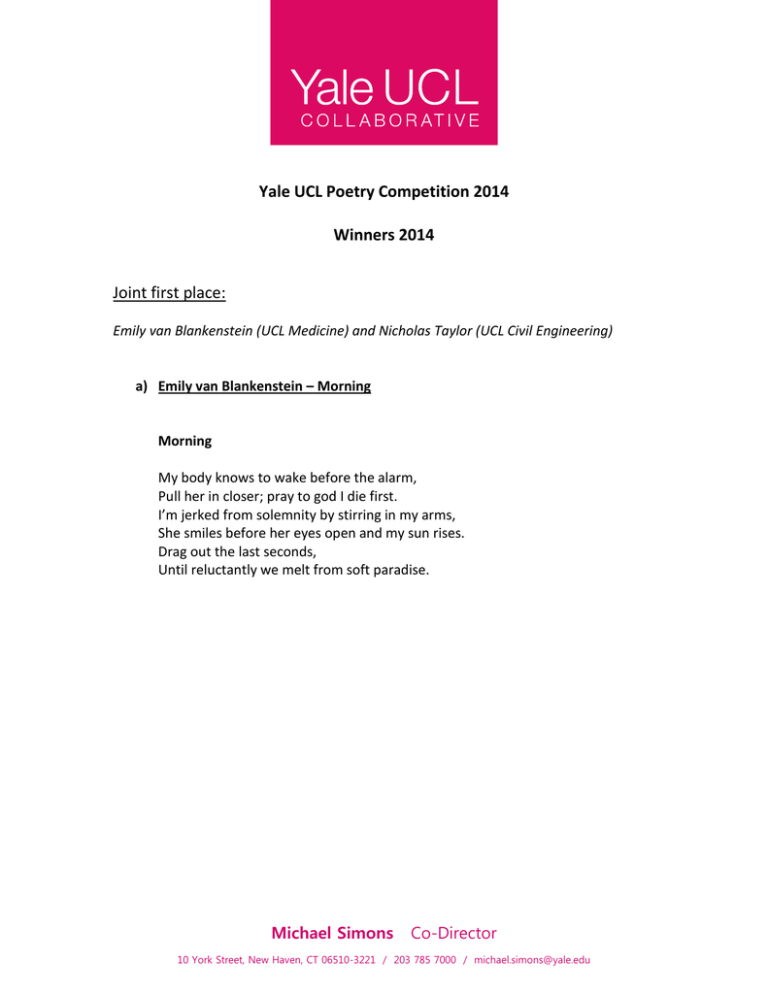
Yale UCL Poetry Competition 2014 Winners 2014 Joint first place: Emily van Blankenstein (UCL Medicine) and Nicholas Taylor (UCL Civil Engineering) a) Emily van Blankenstein – Morning Morning My body knows to wake before the alarm, Pull her in closer; pray to god I die first. I’m jerked from solemnity by stirring in my arms, She smiles before her eyes open and my sun rises. Drag out the last seconds, Until reluctantly we melt from soft paradise. Michael Simons Co-Director 10 York Street, New Haven, CT 06510-3221 / 203 785 7000 / michael.simons@yale.edu b) Nicholas Taylor – Cliffs of Moher Cliffs of Moher It’s lucky that you came today, for I’ll not long be here. The sea will never let me be; I live in constant fear That soon I may be swallowed up into his milky sphere. I was a great hill, once ago, of ancient shales and slates Deposited while dinosaurs still tramped their wild estates. When in my turbid youth I lay, the jousting of the plates, And mountains tumbling from the sky, flung spoils on top of me. They surged and ebbed, till I became a layer-cake of history. Now each day’s the sea’s birthday, and he cuts a slice of me. For the sea loves celebration, but he has no memory, And he thinks each day his birthday, and his joy knows no degree, And he rushes to embrace the land, and yearns to set it free. So the sea will never let me rest; I live in constant dread. He gnaws and scratches at my feet, to topple down my head, Insisting that I lie beside him in his foamy bed. Yet thanks to him my skin is fresh, and I have come to be A sight so rare that my admirers cross the world to see; But if you think that is my gift, you misunderstand me. Flies climb and circle round my face, lice scuttle on my head, And tiny plankton at my feet search my wrinkles to be fed. This itchy torment is my wealth; its value can’t be said. But still the sea won’t leave me be, I live at constant risk That soon I may be shivered down and scattered on his disc. It’s lucky that you came today, for I’ll not long persist. Michael Simons Co-Director 10 York Street, New Haven, CT 06510-3221 / 203 785 7000 / michael.simons@yale.edu Joint second place: Hana Tsuruhara (UCL Medicine), Antonio Seccomandi (UCL Engineering) and Jacob Izenberg (Yale Medicine) a) Hana Tsuruhara – Banana Banana Appearance: Yellow The waxy, smooth, unique peel. Disctinctive, obvious, colourful to see. Looks are everything. Universally agreed. Yet on the inside: white. Moist texture, honey taste, green smell. What it’s remembered for. What it’s wanted for. What it’s hated for. The inside swings the votes Asian on the outside, British within. Look like one, feel like another. Judged as one, judge as another. Such a banana. Michael Simons Co-Director 10 York Street, New Haven, CT 06510-3221 / 203 785 7000 / michael.simons@yale.edu b) Antonio Seccomandi – Kanon Kanon A young land without iron or grain Hosting gods in the fire and rain Nurtured Actaeon and the hound at his chain. All was a song and Truth its refrain. Time ran in circles, like Techne and its master Yet the dog grew fearless and hungrier and faster. Led his steps up an untrodden trail To the virgin shrouded inside Maya’s veil. Diana took his hand and whispered in his ear: “I will tell you who you are, and why you are here.” He gazed in her eyes and there saw a deer. Techne hunted him through the woods and the wild Ridding it of chimeras and idols, forever exiled. Actaeon came to a field of canes, bent by the rising storm Where he found himself again, and regained his human form. “We have unleashed Truth, and disenchanted the Universe” he talks “And remained the only conscience left under the Sun. The seed of the highest dignity planted into fragile stalks Masters of Creation, or beasts on the run.” He petted Techne and whispered: “I am Kanon. A cane in the wind And measure of all things.” Between the lines… The poem tries to benefit from the richness of symbolisms offered by the Ovidian myth of Acteon’s metamorphosis to harmonize into a personal synthesis the thoughts of different philosophers about the relationship between mankind and science. The first stanza sketches a prosperous primitive world, at the dawn of society, the beginning of which was attributed by Rousseau to the discoveries of iron and grain. Then, Science/Techne was a mere instrument for survival in a pantheistic world (v.2). This era was characterized by a circular conception of time, history and human progress (e.g. Gold-Silver-Bronze-Ironages) as opposed to the modern linear one (v.5). The world was explained through the creative and romantic joint efforts of early philosophy, art and Michael Simons Co-Director 10 York Street, New Haven, CT 06510-3221 / 203 785 7000 / michael.simons@yale.edu mythology, the best example of this spirit is embodied in Kallimakos’ “Aitiai”. There was no discontinuity between reality and Truth (v.4). The second and third stanzas allude to the natural progress of science, that peaking in the last two centuries, helped mankind to unveil deeper truths about the world and about us (v.6-10). To my mind some of our greatest discoveries, for example about the Universe or the evolutionism have not been completely metabolized by our collective conscience yet, which now, as Bergson said, needs a “Supplement of Soul”/un supplément d’àme. Sometimes scientific truths were not enough to fill the void left in our hearts by the millenary “Aitiai”. Weber called this “the disenchantment of the world” (v.13). This, I believe, strongly shook our selfawareness, especially when it categorized us indistinctly into the realm of the objects of science’s study. And so Actaeon becomes a deer (v.11), losing control of science that turns against him (v.12). He re-establishes his control over it only after regaining awareness of his intrinsic human dignity (v. 14-15). In the field of canes he is struck by Pascal’s analogy of men like thinking canes in the storm. In spite of the fragility compared to the overwhelming forces of the Universe, Man is the only creature of conscience “under the Sun”, so rightfully above all else. Not in the sense that we have the right to abuse of Creation. In the sense that we must reflect more on where we want to go before we set the goals of science, and not let science decide them by itself, and this reflection must be in a spirit of full awareness of our dignity. Where the meaning of things is not ontologically given (or at least not a satisfying one) it must be humanly created. This is the premise for a good use of the otherwise possibly dangerous tool of science. Actaeon, therefore, is finally aware that he is a cane in the wind for his fragile yet extraordinary nature and because etymologically, as the humanistic tradition proposed, he is the unit of measure of all Creation, the Kanon. Michael Simons Co-Director 10 York Street, New Haven, CT 06510-3221 / 203 785 7000 / michael.simons@yale.edu c) Jacob Izenberg – Essex County Essex County I went up to Eagle Rock to get myself a bird’s-eye view of Essex, saw the interstates, the hoods they savagely plunge through, and the interlacing Jersey Vines hanging languidly above the tracks that deftly weave financiers home and deftly weave financiers back, saw prim Llewelyn Park prance down the hills, lapped by the ghetto tide--the same tide that’s invisible to the square jaws gliding deftly by, saw jetliners line up for Newark winging on the august smoke Cast shadows on the Passaic, whose mills are mostly burned-out broke, and while I saw great ships’ crates flirt with the copper queen, I saw hard-times suck sooty rust from deep inside all iron things. Michael Simons Co-Director 10 York Street, New Haven, CT 06510-3221 / 203 785 7000 / michael.simons@yale.edu
